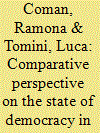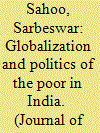| Srl | Item |
| 1 |
ID:
132939


|
|
|
|
|
| Publication |
2014.
|
| Summary/Abstract |
The scholarship on Central and Eastern European politicsand societies is well established in the literature. Over the past two decades, scholars have addressed a variety of topics including the role of civil society in transition and democratic consolidation (Linz & Stepan 1996a, 1996b; P?ibá? & Young 1999; Pridham 2001; Pollack & Wielgohs 2004); the process of institution-building and the functioning of institutions (Karp 1994; Zielonka 2001; Malova & Haughton 2002); the development of political parties and their contribution to democracy (Kitschelt 1992; De Waele 1999; Lewis 2001, 2008; Hough 2005; Deegan-Krause & Haughton 2010; Burnell & Gerrits 2010); the role of external actors in the process of consolidation of democracy, and in particular the role of the EU and the enlargement process (Papadimitriou 2002; Dimitrova 2004; Schimmelfennig & Sedelmeier 2005; Vachudova 2005; Epstein & Sedelmeier 2009; Morlino & Sadurski 2010; O'Brennan 2011); populist parties (Mudde 2007; De Waele & Pacze?niak 2010; Pankowski 2011) and the ambiguous role of nationalism (Latawski 1994; Auer 2004); the problem of the rights of ethnic, linguistic, religious and national minorities (Taras 1998; Rechel 2009); the relationship between justice and politics (Anderson et al.2005; Coman & De Waele 2007; Coman 2009; Piana 2010); the construction of a market economy and the relationship between democracy and economic policies (Jeffries 1996; Stark & Bruszt 1998; Hasselman 2006; Myant & Drahokoupil 2010); political cultures (Pollack 2003; Klingemann 2008); the problems related to corruption (Smilov & Toplak 2007; Schmidt-Pfister & Moroff 2012); and the development of regionalisation and the role of local governments (Hughes et al.2004a, 2004b; Coulson & Campbell 2007).
|
|
|
|
|
|
|
|
|
|
|
|
|
|
|
|
| 2 |
ID:
129451


|
|
|
|
|
| Publication |
2014.
|
| Summary/Abstract |
The paper addresses two basic questions in the globalization literature: (1) is globalization a threat or an opportunity? And (2) how far does market deepening actually encourage genuine substantive democracy in the world? Many scholars have argued that globalization has resulted in increasing inequality and marginalization of the poor, which is not conducive for democracy. Drawing on the case of India, this paper, however, argues that the rolling back of the welfare state and the demise of developmentalism led to the mobilization of the masses against the elitist and exploitative agenda of globalization. As a result, a counter-hegemonic vibrant civil society has emerged, which challenges the hegemony of the elites and channels the empowerment agenda of the subaltern groups. This new politics of the subaltern is grounded on the idea of social justice and citizenship rights, which is redefining the nature of the Indian state and democracy.
|
|
|
|
|
|
|
|
|
|
|
|
|
|
|
|